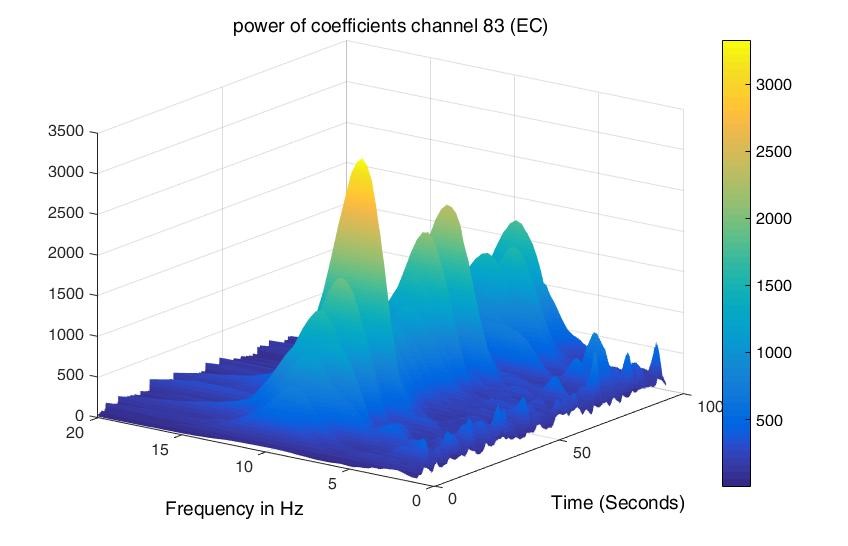Power Spectrum of Brain for Complex Task using Electroencephalogram
Keywords:
Neuroscience; EEG; cognitive task; Wavelet Coefficients and Power SpectrAbstract
Cognitive processes are constantly under critical relevance in the field of neuroscience. In the examination of Electroencephalogram (EEG) data, frequency bands are always significant because they determine how the brain responds to various activities and circumstances in different situations. However, it is usually accepted that each brain region is associated with a certain activity, such as auditory, visual, or cognitive tasks. Moreover, to retrieve additional information from the brain, it is often required to establish new neural connections. In this study, the researchers established a functional relationship between different EEG frequencies and the cognitive task under investigation. The frequencies of alpha, beta, and theta waves are often discussed in connection to cognitive tasks, but the frequency of the delta wave is seldom referenced throughout the cognitive process. We then focused on the frequency of delta waves in different parts of the brain, such as the occipital and front alregions
References
Golonka, K., Golonka, Krystyna Gawlowska, Magda Mojsa-Kaja, Justyna Marek, Tadeusz, Topa, Gabriela, Psychophysiological Characteristics of Burnout Syndrome: Resting-State EEG Analysis. BioMed Research International, 2019. 2019: pp 764-354. DOI:10.1155/2019/3764354
Putman, P., Resting-state EEG delta–beta coherence in relation to anxiety, behavioral inhibition, and selective attentional processing of threatening stimuli. International Journal of Psychophysiology, 2011. vol80, issue1, pp63-68. DOI: 10.1016/J.IJPSYCHO.2011.01.011
Mohamed, A.M.A., et al., Classification of Resting-State Status Based on Sample Entropy and Power Spectrum of Electroencephalography (EEG). Applied Bionics and Biomechanics, 2020. vol2020: pp 853-238.DOI: 10.1155/2020/8853238
Boring, M.J., et al., Continuous decoding of cognitive load from electroencephalography reveals task-general and task-specific correlates. 2020. vol17 issue 5, pp16-56.DOI: 10.1088/1741-2552/abb9bc
Zhao, J., et al., Analysis of complex cognitive task and pattern recognition using distributed patterns of EEG signals with cognitive functions. 2020: pp 1-10. DOI: 10.1007/s00521-020-05439-9
Kongwudhikunakorn, S., et al., A Pilot Study on Visually Stimulated Cognitive Tasks for EEG-Based Dementia Recognition. 2021. vol70: pp1-10.
Montilla-Trochez, Daniela ; Salas, Rodrigo ; Bertin, Alejandro ; Griškova-Bulanova, Inga ; Lisboa, Paulo ; Saavedra, Carolina, Convolutional neural network for cognitive task prediction from EEG’s auditory steady state responses. in Proceedings of the 5th Congress on Robotics and Neuroscience, February 27-29, 2020, Valparaíso, Chile. 2020. CEUR-WS. p. 44-50
Zafar, Raheel, Malik, Aamir S.Amin, Hafeez Ullah, Kamel, Nidal, Dass, Sarat, Ahmad, Rana Fayyaz, EEG Spectral Analysis during Complex Cognitive Task at Occipital. 2014 pp 907-910, DOI: 10.1109/IECBES.2014.7047643.
Duan, W., et al., Reproducibility of power spectrum, functional connectivity and network construction in resting-state EEG. Journal of Neuroscience Methods, 2021. vol348: pp108-985. DOI: 10.1016/j.jneumeth.2020.108985
Friedman, N., et al., EEG-based prediction of cognitive load in intelligence tests. 2019. vol 13 issue:1 p. 1-91. DOI: 10.3389/fnhum.2019.00191
Klimesch, W., EEG alpha and theta oscillations reflect cognitive and memory performance: a review and analysis. Brain research reviews, 1999. vol29, issue 2 pp 169-195. DOI: 10.1016/s0165-0173(98)00056-3
Babiloni, C., et al., Pre-and poststimulus alpha rhythms are related to conscious visual perception: a high-resolution EEG study. Cerebral cortex, 2006. vol16, issue 12 pp 1690-1700. DOI: 10.1093/cercor/bhj104
Knyazev, G.G., D.J. Schutter, and J. Van Honk, Anxious apprehension increases coupling of delta and beta oscillations. International Journal of Psychophysiology, 2006. vol61, issue 2: pp 283-287. DOI: 10.1016/j.ijpsycho.2005.12.003
Harmony, T., et al., EEG delta activity: an indicator of attention to internal processing during performance of mental tasks. International journal of psychophysiology, 1996. vol24, issue 1: pp 161-171.
Jensen, O., et al., Oscillations in the alpha band (9–12 Hz) increase with memory load during retention in a short-term memory task. Cerebral Cortex, 2002. vol12, issue 8 pp 877-882. DOI: 10.1093/cercor/12.8.877
Knyazev, G.G., EEG delta oscillations as a correlate of basic homeostatic and motivational processes. Neuroscience & Biobehavioral Reviews, 2012. vol36, issue 1 pp 677-695 DOI: 10.1016/j.neubiorev.2011.10.002.
Pathania, A., et al., Exploring the reliability and sensitivity of the EEG power spectrum as a biomarker. International Journal of Psychophysiology, 2021. vol160, issue 1 pp 18-27. DOI: 10.1016/j.ijpsycho.2020.12.002
Prada, L., et al., EEG delta oscillations index inhibitory control of contextual novelty to both irrelevant distracters and relevant task‐switch cues. Psychophysiology, 2014. vol51, issue 7 pp 658-672. DOI: 10.1111/psyp.12210
Raghavachari, S., et al., Theta oscillations in human cortex during a working-memory task: evidence for local generators. Journal of Neurophysiology, 2006. vok95, issue 3 pp 1630-1638. DOI: 10.1152/jn.00409.2005
Moran, R.J., et al., Peak frequency in the theta and alpha bands correlates with human working memory capacity. Frontiers in human neuroscience, 2010. vol4: pp. 200. DOI:= 10.3389/fnhum.2010.00200
Jim Lagopoulos 1, Jian Xu, Inge Rasmussen, Alexandra Vik, Gin S Malhi, Carl F Eliassen, Ingrid E Arntsen, Jardar G Saether, Stig Hollup, Are Holen, Svend Davanger, Øyvind Ellingsen, Increased theta and alpha EEG activity during nondirective meditation. The Journal of Alternative and Complementary Medicine, 2009. vol15, issue 11 pp 1187-1192. DOI: 10.1089/acm.2009.0113
Raheel Zafar, Muhammad Noman Malik, Huma Hayat, Aamir Saeed Malik, Decoding Brain Patterns for Colored and Grayscale Images using Multivariate Pattern Analysis. 2020. vol14, issue 4) pp 1543-1561 DOI:10.3837/tiis.2020.04.008.
E Başar 1, C Başar-Eroglu, S Karakaş, M Schürmann, Gamma, alpha, delta, and theta oscillations govern cognitive processes. International Journal of Psychophysiology, 2001. vol39, issue 2 pp 241-248. DOI: 10.1016/s0167-8760(00)00145-8
Knyazev, G.G., Motivation, emotion, and their inhibitory control mirrored in brain oscillations. Neuroscience & Biobehavioral Reviews, 2007. vol31, issue 3 pp 377-395.

Published
How to Cite
Issue
Section
License
Copyright (c) 2022 50SEA

This work is licensed under a Creative Commons Attribution 4.0 International License.




















